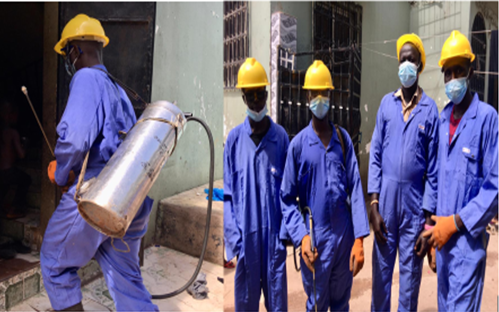By: Dawda Baldeh
Momodou A Jawo, Regional Vector Control Officer in Basse, at the National Malaria Control Unit under the Ministry of Health described malaria as a deadly disease, saying they want to eliminate malaria in the Gambia as other countries did.
As part of their efforts to eliminate malaria, the malaria control unit has embarked on a campaign by distributing bed nets and house spraying in the Upper River Region (URR). These are programs geared toward eliminating malaria.
Mr Jawo said the campaign to eliminate malaria is very significant. “We are spraying houses where people sleep to stop the mosquitos. We have given bed nets to all the households in the Upper River Region.
We also have the Seasonal Malaria Chemoprevention (SMC) which is given to children between three to fifty-nine months (3-59). The government is also conducting health promotion to create awareness among people so they can prevent themselves from malaria,” he said.
The campaign to eliminate malaria is in three phases; which include bed net distribution, Indoor Residual Spraying (IRS) and Seasonal Malaria Chemoprevention (SMC), officials said.
Mr Jawo buttresses the importance of all these stages in the fight to eliminate malaria. “All these stages are very important because it will help to stop the spread of the mosquitos’ bite which causes malaria,” he added.
He said the communities have been supportive since the campaign started. “We are the servants of the people so if you are within the people you should know that you are their servant and do what they want.
The campaign is in the interest of the public and we want people to take ownership of the campaign because health is everyone’s business.”
Omar Jallow, a Public Health Officer at Basse District Hospital also emphasized the need for people to campaign to eliminate malaria. He disclosed that URR was recording a high number of malaria cases before the beginning of the campaign but noted that it has now been reduced. Mr Jallow described malaria as a ‘seasonal disease’, saying it can be eliminated.
“Most of the cases are recorded between June and October. The country is still recording malaria cases this is why we have distributed bed nets to several communities to help prevent them from the mosquito bite,” he highlighted.
The Long Lasting Insecticide-treated nets (LLIN) campaigns led by the national malaria control unit intended to reduce the burden of malaria by distributing free LLIN to households.
The campaign to eliminate malaria has been described as an important approach to combat the spread of malaria annually. “It will reduce the lifespan of the mosquitos which causes malaria.
The program has registered significant achievement because it has reduced the rate of recorded malaria cases in the region,” Omar Jallow added.
Lamin Jammeh, data collector at the Ministry of Health said, they are collecting data to keep the information for future plans. “Through the data, the ministry will know what it has achieved and what more need to be done.
Data collection is key in the campaign because it will definitely help us. Without data, it will be very difficult to know who has benefited and the achievement recorded,” he noted.
However, Mr Jammeh said they are faced with network problems in collecting data in many parts of the country. Every day we send the information collected but this is really challenging.”
Ousainou Mahanera, Councilor of Gambisara Ward in Gimara Constituency, said the distribution of bed nets and spraying of the houses has reduced malaria cases in the region.
He added that the program is very important and urged his people to give chance to the health workers to spray their houses.
Malaria is a life-threatening disease caused by parasites that are transmitted to people through the bites of infected female Anopheles mosquitos.
According to WHO, Gambia is one of the six countries in the World Health Organization African Region that have achieved the 2020 milestones of reducing malaria cases and deaths by 40% compared to 2015.




